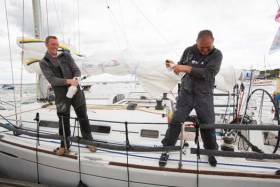Displaying items by tag: TwoHanded
Date Set For Round Britain And Ireland Two-Handed Race In 2018
#RB&I - The Royal Western Yacht Club of England has announced that the next edition of the Round Britain and Ireland two-handed race will start from Plymouth on Sunday 3 June 2018.
It marks the 14th running of the quadrennial yacht race, which was established in 1966 by the Cockershell hero Major Blondie Hasler.
The most recent edition in 2014 saw Liam Coyne and Brian Flahive on Lula Belle become the first two-handed team to win the race, which comprises five legs totalling some 2,000 miles on a course sailed clockwise around the British Isles and Ireland, leaving all islands and rocks to starboard.
The event is open to professional and amateur yachtsmen in mono and multihulls between 28ft and 5ft in length overall.
Race director David Searle, a former race competitor and current member of the Royal Western YC, anticipates a strong local and international entry of up to 60 boats to contest what’s described as one of the world's toughest coastal two-handed races.
The race record stands at 15 days and seven hours, but sailors should allow about 23 days to complete the course, including the four 48-hour rest-and-repair stopovers in Kinsale, Castle Bay, Lerwick and Lowestoft.
The Notice of Race and entry form can be found at the Round Britain and Ireland Yacht Race website HERE.
























































